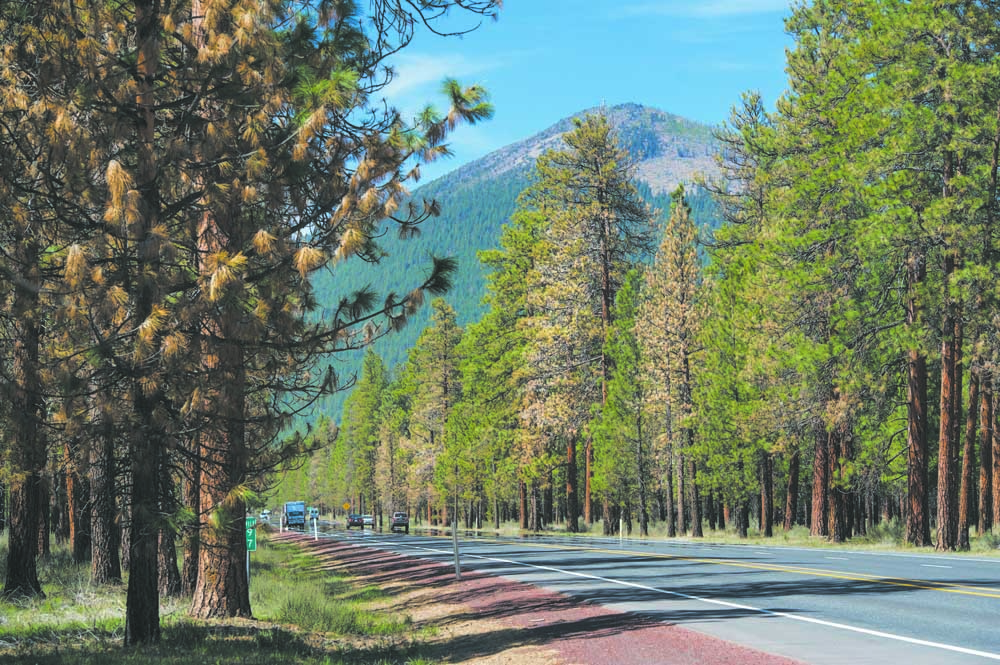State rule would limit use of chemical that killed trees near Sisters
Published 12:00 am Thursday, January 31, 2019

- Dozens of ponderosa trees that are dead or dying line U.S. Highway 20 just west of Sisters on Wednesday, May 2, 2018. The Oregon Department of Transportation applied herbicide to kill brush along the highway from 2013-2015 and accidentally killed the trees in the process. (Ryan Brennecke/Bulletin file photo)
A proposed statewide rule would curb the use of a controversial weedkiller linked to the death of more than a thousand trees near Sisters, but some environmentalists are concerned it doesn’t go far enough.
On Wednesday, the Oregon Department of Agriculture released a proposed rule that significantly limits where herbicides containing aminocyclopyrachlor, the main active ingredient in the product that killed trees northwest of Sisters, may be used in Oregon. The rule, which could be in effect by spring, would prohibit using the chemical in wildlife management areas, swamps, canals, sage grouse habitat and many other natural environments, while maintaining temporary restrictions on use in right-of-ways for roads, highways, railroad tracks, bike paths and more.
Trending
Additionally, the proposal prohibits using aminocyclopyrachlor, commonly abbreviated as ACP, in areas where the roots of “desirable trees and shrubs” may be present, a recognition that the chemical can spread through root systems. Another provision of the rule, which is available in full on ODA’s website, prevents trees and other material exposed to ACP from being milled, composted or otherwise reused.
Dale Mitchell, program manager for the state agriculture agency, said the proposed rule reflects the agency’s findings that the chemical is more dangerous than it originally believed, with impacts in Sisters and other parts of Central Oregon that it doesn’t want to see repeated statewide.
If approved, Oregon will be the first state on the West Coast to restrict the use of ACP statewide, Mitchell said.
“We feel that this will be very proactive,” he said.
But not everyone agrees. Lisa Arkin, executive director of the Eugene-based nonprofit Beyond Toxics, said the proposed rule might not be enough to keep the chemical from getting into the soil and impacting plants. Ultimately, she and other environmentalists would prefer to see the agency prevent it from being used in Oregon altogether, she said.
“I think there’s a lot of good things in this rule, but the best thing would have been to ban it,” Arkin said.
Trending
In Central Oregon, the effects from ACP date back to 2012, when state and federal agencies began planning a multiyear effort to spray a weedkiller known as Perspective alongside U.S. Highway 20, in order to reduce the flammable weeds along the highway.
After researchers from the U.S. Forest Service noticed ponderosa pines showing browning needles and other symptoms, testing revealed that ACP was present in the trees. By 2018, more than 1,000 ponderosa pines and other trees were dead or dying along a 12-mile stretch of the highway.
Arkin said Beyond Toxics and other environmentalists pushed ODA to reopen its investigation of the chemical last year in response to dead trees in Central Oregon and impacts to ornamental trees across the Midwest caused by a prior herbicide that contained ACP. In September, the agency approved a temporary rule banning the chemical, but only in right-of-ways.
In drafting the rule announced Wednesday, the agency hopes to balance the concerns environmental groups have with the benefits the product provides for cities and counties looking to get rid of weeds quickly and cheaply, Mitchell said.
“This active ingredient may still have some beneficial use, especially with noxious weeds,” he said.
However, Arkin pointed to unanswered questions about ACP, including how the product spreads through the environment, as evidence that the state needs stronger restrictions. While the herbicide was only applied six feet from Highway 20, Arkin said testing showed that trees 60 feet from the road showed impacts from the chemical.
“When a chemical has been found to cause damage well away from where it was applied … that is the type of chemical that deserves a ban,” Arkin said.
In lieu of an outright ban, Arkin said she’d like to see restrictions on using it on volcanic or other permeable soils, along with explicit restrictions banning use in residential areas.
State agriculture officials will hold a public hearing on the rule in Bend, at the Deschutes County Road Department building, 61150 SE 27th St., from 6 to 7:30 p.m. Feb. 15. Mitchell said the agency hopes to finalize the rules by the end of March.
— Reporter: 541-617-7818, shamway@bendbulletin.com








